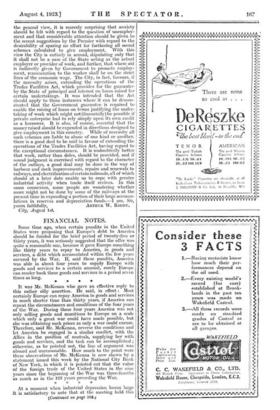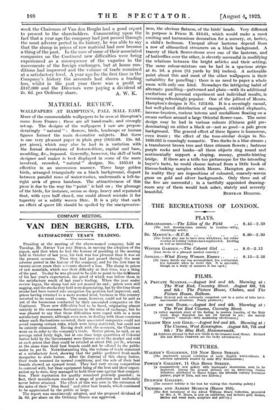FINANCIAL NOTES.
Some time ago, when certain pundits in the United States were proposing that Europe's debt to America should be funded for the brief period of twenty-five or thirty years, it was seriously suggested that the offer was quite a reasonable one, because it gave Europe something like thirty years to repay to America, in goods and services, a debt which accumulated within the few years covered by the War. If, said these pundits, America was able in about four years to supply Europe with goods and services to a certain amount, surely Europe can render back these goods and services in a period seven times as long. * * * It was. Mr. McKenna who gave an effective reply to this rather silly assertion. He said, in effect : Most certainly Europe can repay America in goods and services in much shorter time than thirty years, if America can repeat the circumstances and conditions of the four years of the War. During those four years America was not only selling goods and munitions to Europe on a scale which only a great war could have made possible, but she was obtaining such prices as only a war could excuse. Therefore, said Mr. McKenna, reverse the conditions and let America be engaged in a similar conflict, with the Allies in the position of neutrals, supplying her with goods and services, and the task can be accomplished ; otherwise, as he pointed out, the line of argument was absurd and unreasonable. How much to the point were these observations of Mr. McKenna is now shown by a statement issued this week by the National City Bank of New York, in which it is pointed out that the value of the foreign trade of the United States in the nine years since the beginning of the War was three-fourths as much as in the 125 years preceding the War.
At a moment when industrial depression looms large it is satisfactory to note that at the meeting held; this (Continued on page 168.) week the Chairman of Van den Berghs had a good report to present to the shareholders. Commenting upon the fact that a year ago the company had just passed through the most adverse period in its history, he was able to say that the slump in prices of raw material had now become a thing of the past. In the case of some of their associated companies on the Continent new difficulties were being experienced as a consequence of the vagaries in the movements of the foreign exchanges, but at home con- ditions had improved and the volume of trade remained at a satisfactory level. A year ago for the first time in the Company's history the accounts had shown a trading loss, whilst in the past year there was a profit of £347,000 and the Directors were paying a dividend of



































 Previous page
Previous page